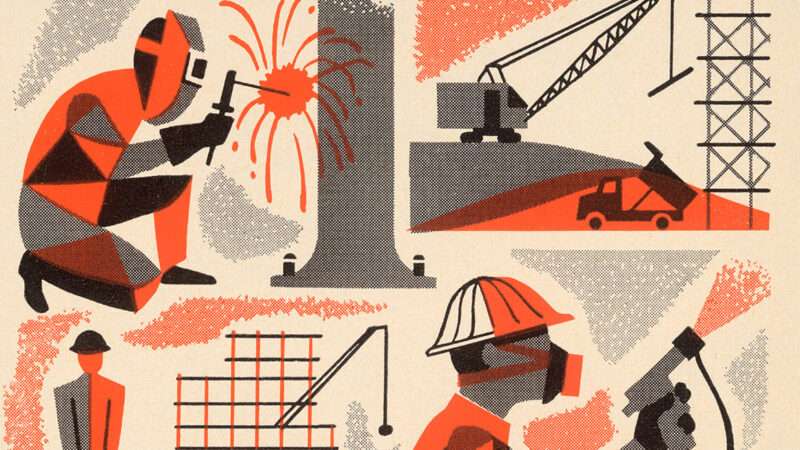
Since taking office, President Joe Biden has sought to position himself as an ally of working Americans. His administration is enacting what it calls a "worker-centric" trade policy, and the president scarcely seems to give a public address without mentioning the importance of union jobs.
"You're a gigantic reason why I'm standing here—standing here today as your president," Biden said in a June keynote address at the AFL-CIO annual convention in Philadelphia. "I owe you. From the very beginning of my running for office, back when I was a kid, it was labor, the unions."
Yet despite all he believes he owes American laborers, Biden's economic policies are punishing them as consumers.
Consider that supposedly worker-centric trade policy. Biden has left in place many of the tariffs imposed by President Donald Trump, including the levies on aluminum and steel. By artificially hiking the price of imported steel, those tariffs are supposed to boost domestic production, creating more and better-paying steelworker jobs. But the cost of the tariffs rebounds onto every industry that uses steel to make other products. While about 57,000 Americans work in steelmaking jobs, more than 12 million are employed in manufacturing jobs that use steel. The tariffs hurt those workers.
Even steelworkers suffer from the tariffs, which raise prices for cars, appliances, and a host of other products. The Peterson Institute for International Economics, a trade policy think tank, estimates that repealing those tariffs would put about $800 back in the average family's pockets this year.
Biden also has decided to extend tariffs on solar panels and their component parts, which were due to expire this year. In theory, those tariffs promote domestic manufacturing. In reality, they have cost more than 62,000 jobs in the four-plus years since Trump first implemented them by sharply cutting the number of solar panels available for installation and service, according to the Solar Energy Industries Association.
Biden's infrastructure package is another monkey's paw for laborers. The law chips away at the Reagan administration's reforms to federal "prevailing wage" mandates, which determine how much workers get paid for federally funded projects. The White House says the revised mandates, which will boost hourly wages by an average of $3.65, guarantee higher pay for workers. It blissfully ignores the negative impact on infrastructure projects, which is a loss for all Americans who are trying to get somewhere—including organized laborers.
In July, Biden put the finishing touches on a $90 billion bailout of private-sector union pension plans that have been slipping toward insolvency, a provision slipped into last year's $1.9 trillion American Rescue Plan. More than anything else he has done in office, this bailout is a cynically pro-union move: When Biden told the AFL-CIO "I owe you," he apparently meant that literally. The full cost of the bailout was added to the national debt, meaning workers and consumers eventually will pay for it in the form of higher taxes, slower economic growth, or (more likely) both.
Biden and his labor union allies, of course, argue that corporations should pay for these policies through higher taxes. But that's a red herring. Taxes and tariffs ultimately are paid by people, not businesses. And since the federal government's main sources of revenue are income and payroll taxes, it will be future workers who foot most of the bill.
The fact that workers are consumers too has always been an implicit part of the wider labor movement, which has pushed for higher pay and fewer hours at work. Biden is treating labor policy as if it is a zero-sum game in which workers can benefit at the expense of consumers—as if people fit into only one of those categories.
If it wasn't already obvious that policies aimed at helping Americans as workers can hurt them as consumers, the last year has underlined that point. In July, the Department of Labor reported that wages were up 5.1 percent over the previous year, while prices had risen by more than 9 percent during the same time. Is this a worker-centric economy?
Trade and labor policies should not be worker-centric or consumer-centric. They should be market-centric, because trade and labor are both parts of a market system that benefits Americans as workers and consumers.
The post Biden Forgets That Workers Are Consumers Too appeared first on Reason.com.







